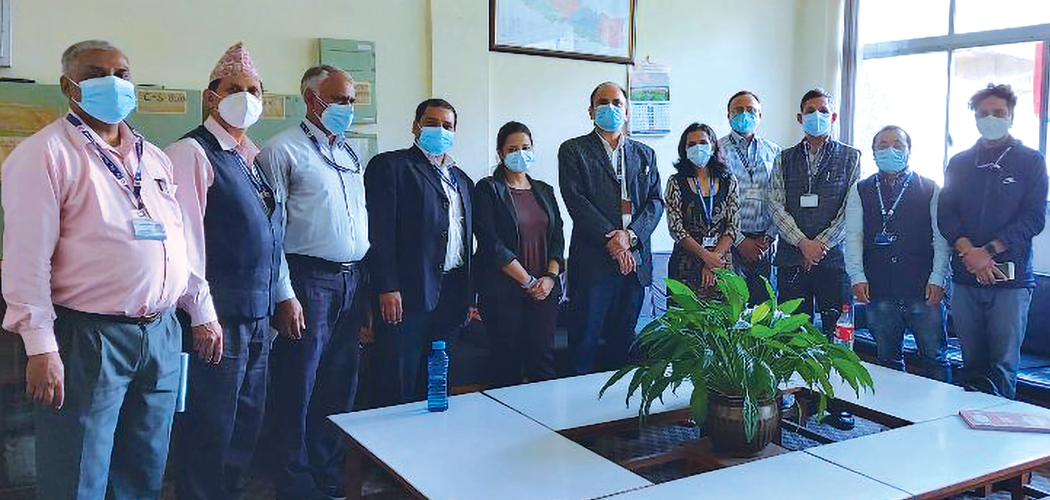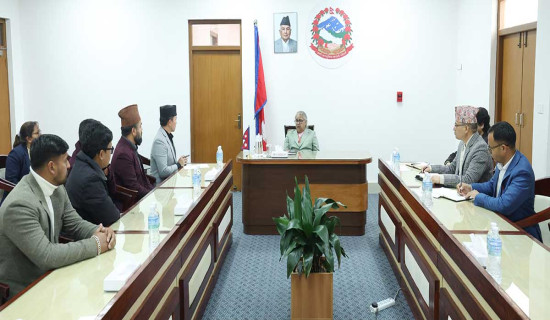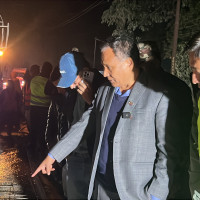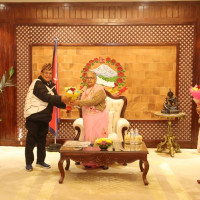- Sunday, 21 December 2025
Health insurance scheme needs timely treatment
Kathmandu, June 20: Tribhuvan University Teaching Hospital (TUTH) started providing services under the government’s health insurance scheme since 2020. It was before the scheme had been implemented in Kathmandu.
“We wanted to provide better services to the public due to which we requested to be associated with the scheme. Now, we have decided to not provide services under the scheme as the institution cannot survive under current conditions,” said Dr. Dinesh Kafle, executive director of TUTH.
Issuing a notice on Friday, TUTH informed that the hospital will halt the scheme from June 29 as the Health Insurance Board (HIB) failed to reimburse the necessary amount in exchange for the provided services timely.
The HIB has provided around Rs. 69.1 million to the TUTH since it got registered with the scheme two years ago. However, TUTH’s director Dr. Kafle informed that it was not the total amount which they have claimed for.
Meanwhile, Dr. Kafle said that the delay in receiving the amount was not the only reason.
“The HIB’s package rate for an MRI scan is Rs. 4,800 while it costs Rs. 8,000 under our hospital rate. A person enrolled with health insurance comes with a pain in back but asks for MRI of not only his back but his head as well,” said Dr. Kafle.
When the doctors suggest it is unessential, Dr. Kafle informed that the patient start quarrelling and demand to be allowed to receive the treatment s/he is seeking.
“Patients also demand more medicines than required under the scheme as they don’t have to pay from the pocket. More than an economic reason, it is technical issues that have led us to postpone services under the programme,” said Dr. Kafle.
On June 9, Nuwakot-based Trishuli Hospital had issued a notice on its Facebook which requested public enrolled with the scheme to not seek a referral without check-up. It also asked to not force doctors in prescribing free medicines forcefully and to not demand medicines for more than a month.
The scheme was launched in 2016-17 from three districts as a pilot programme and has reached 746 local levels of 77 districts until now.
Under the plan, a family of up to five members must pay a premium of Rs. 3,500 annually to avail of health services up to Rs. 100,000. A family comprising more than five members must pay Rs. 700 for each additional member. This would qualify them for an additional insurance cover of Rs. 20,000.
“Public enrolled in the scheme are receiving services from 450 health institutions across the country. Almost every health service and 1,133 medicines can be availed from the scheme,” said Dr. Damodar Basaula, executive director at HIB.
According to HIB, a total of 5.7 million people are enrolled in the scheme and 75 per cent of individuals are renewing it annually.
“More people are being attracted towards the scheme as it is really beneficial. We are collecting a premium of around Rs. 3 billion annually but have to reimburse more than thrice the collected amount to the health centres providing the services,” said Dr. Basaula.
The HIB had received Rs. 7.5 billion budget for the current fiscal year out of which Rs. 4.82 billion was allocated to be reimbursed for the health centres. The remaining amount was asked to be used for daily operation and paying the premium of seven targeted groups. Around 25 per cent of 5.7 million insured belong to the targeted groups.
“We have to pay premium of a large portion of insured individuals and also reimburse billions to health centres providing the services under our scheme. How can such a small budget address it?” said Dr. Basaula.
Moreover, the government, in the budget speech for 2022/23, has announced to provide services under the health insurance scheme from all government and community hospitals.
“Public have been found visiting their local first point of treatment only to seek a referral for a tertiary hospital in Kathmandu Valley. If the health insurance scheme needs to be implemented effectively, local health centres should be upgraded,” said Dr. Basaula.
However, tertiary hospitals have been facing difficulties in continuing services under the scheme at a time when they receive insufficient budget.
“Yesterday, we received Rs. 91.3 million to pay four months’ salary of our staff. We require Rs. 110 million to pay a month’s salary of our staff. We haven’t received the entire promised amount during COVID-19 pandemic as well,” Dr. Kafle told The Rising Nepal. The TUTH has been allocated a budget of Rs. 210 million for the upcoming fiscal year.
“We still have Rs. 80 million to receive from the HIB for the services we have provided. We are also paying salary of 12 individuals deployed to assist the health insurance scheme in the hospital,” said Dr. Kafle.According to the stakeholders, government needs to make certain policy changes to make the scheme effective for all.
“The rate package of the HIB doesn’t suffice. It should be revised. The HIB should also manage manpower properly and establish a dedicated communication service to receive the claims and verify them soon,” said Dr. Kafle.
Meanwhile, Dr. Basaula informed that the board was in process to revise the current package and implement a new one on the basis of several indicators listed by the law.
“The scheme has reached all the districts but we are working with the same manpower, mostly temporary officials we had four years ago. The increasing number of insured and an exponential growth in people visiting health centres have obstructed us from performing our responsibility effectively,” said Dr. Basaula. Dr. Basaula stressed that all the governments till date have stated to prioritise health insurance scheme but have always failed to address it in the budget.
Doctors have stressed that the health insurance scheme should continue effectively since more public have started taking health check-ups seriously. However, they urged the need to teach public the correct ways to utilise the scheme.
Officials at the Ministry of Health and Population informed that they requested more support for the health insurance and hospitals but the government failed to bring budget prioritising health.
















